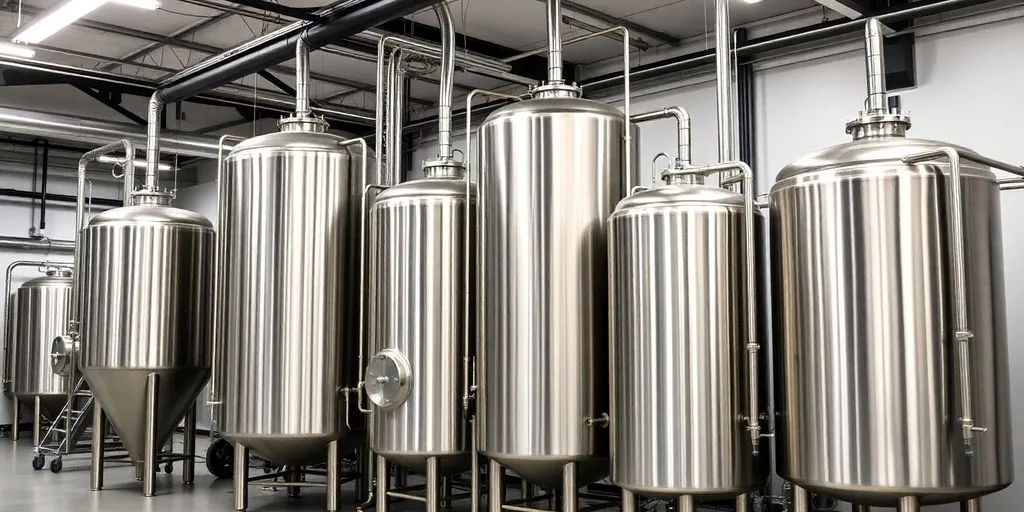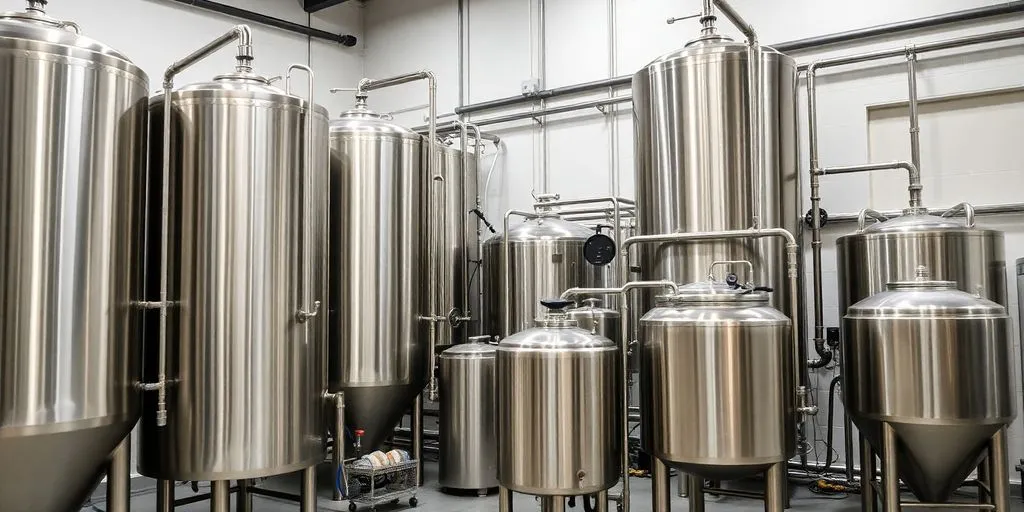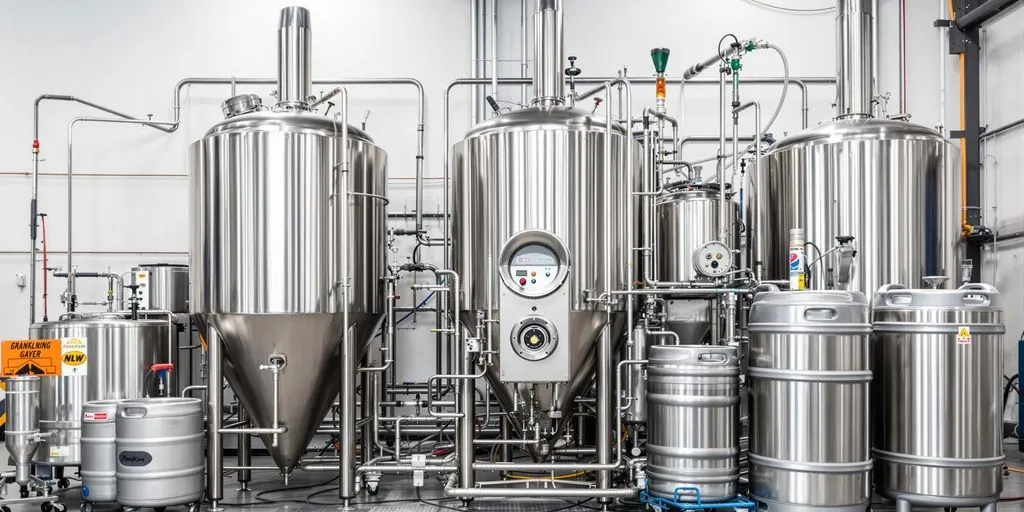When it comes to brewing beer on a larger scale, having the right equipment is key. Commercial Beer Brewing Equipment not only helps in creating great flavors but also ensures that the brewing process runs smoothly and efficiently. In this article, we will explore the different aspects of brewing equipment, from its components to innovations and maintenance. Understanding these elements can help you make informed decisions for your brewery.

Key Takeaways
- Commercial beer brewing equipment includes essential parts like kettles, fermenters, and filtration systems.
- Quality equipment can significantly improve the taste and consistency of the beer.
- Choosing the right brewing system depends on your brewery’s size, goals, and budget.
- New technologies in brewing focus on automation and energy savings, making processes easier and greener.
- Regular maintenance and inspections are crucial to keep brewing equipment in good shape and avoid problems.
Understanding Commercial Beer Brewing Equipment
Commercial brewing equipment is essential for producing beer on a larger scale. At its core, commercial brewing equipment includes all the machinery, tanks, fermenters, and heating units needed to produce beer efficiently. Here are some key components:
Key Components of Brewing Systems
- Mash Tun: Where grains are mixed with water to extract sugars.
- Boil Kettle: Used to boil the wort and add hops.
- Fermenter: The vessel where yeast converts sugars into alcohol.
Importance of Equipment Quality
Quality equipment is crucial for consistent beer production. High-quality equipment can lead to:
- Better flavor profiles.
- Increased efficiency in brewing processes.
- Reduced maintenance costs over time.
How Equipment Affects Beer Flavor
The type of equipment used can significantly influence the final taste of the beer. For example:
- Material: Stainless steel vs. copper can change the flavor.
- Temperature Control: Precise temperature management can enhance fermentation.
- Filtration Systems: Affects clarity and taste.
Investing in the right brewing equipment is vital for any brewery aiming to create unique and high-quality beers.
Choosing the Right Brewing System for Your Brewery
When it comes to selecting the right brewing system for your brewery, there are several important factors to consider. Choosing the right equipment can make a big difference in your brewing process and the quality of your beer. Here are some key points to keep in mind:
Factors to Consider When Selecting Equipment
- Size and Capacity: Think about how much beer you plan to produce. Larger systems can handle more volume but may require more space and investment.
- Type of Brewing System: There are different types of systems, such as all-in-one systems or modular setups. Each has its own benefits depending on your needs.
- Customization Options: Some systems allow for more customization, which can be important for creating unique beer styles.
Scalability and Future Expansion
- Growth Potential: Consider how your brewery might grow in the future. Will the equipment you choose allow for easy upgrades or expansions?
- Market Demand: Think about the types of beers that are popular in your area and how your equipment can help you meet that demand.
Cost vs. Quality: Making the Right Investment
- Budget: Set a budget for your equipment purchase. Remember that cheaper options may not always be the best in the long run.
- Quality Matters: Investing in high-quality equipment can lead to better beer and fewer problems down the line.
- Long-Term Savings: Sometimes, spending a little more upfront can save you money on repairs and maintenance later.
Choosing the right brewing system is crucial for your brewery’s success. It can affect everything from production efficiency to the taste of your beer.
In summary, selecting the right brewing system involves understanding your needs, planning for the future, and balancing cost with quality. By considering these factors, you can make an informed decision that will benefit your brewery for years to come.
Innovations in Brewing Technology
Automation in Brewing Processes
Automation is changing the way breweries operate. With the help of technology, many tasks can be done automatically, which saves time and reduces mistakes. Automated systems can control temperatures, monitor fermentation, and even package beer. This means brewers can focus more on creativity and less on routine tasks.
Energy Efficiency and Sustainability
Breweries are also looking for ways to be more energy-efficient. By using renewable energy sources and improving their processes, they can save money and help the environment. Some breweries are even recycling water and using it in their brewing process. This not only cuts costs but also reduces waste.
Advanced Filtration and Quality Control
Quality is key in brewing, and new filtration systems are making it easier to maintain high standards. These systems can remove unwanted particles and ensure that the beer tastes great. Advanced filtration helps in keeping the beer clear and fresh, which is important for customer satisfaction.
Innovations in brewing technology are not just about making beer; they are about making better beer.
| Technology Type | Benefits | Examples |
|---|---|---|
| Automation | Saves time, reduces errors | Automated brewing systems |
| Energy Efficiency | Cuts costs, eco-friendly | Solar panels, water recycling |
| Advanced Filtration | Improves taste, maintains quality | Membrane filters, carbon filters |
Maintaining and Troubleshooting Brewing Equipment

Routine Maintenance Practices
To keep your brewing equipment in top shape, regular maintenance is key. Here are some important practices:
- Inspect all connections and seals for leaks.
- Clean the brewing system thoroughly after each use.
- Check and replace worn-out parts as needed.
Common Equipment Issues and Solutions
Brewing equipment can face various problems. Here are some common issues and how to fix them:
- Leakage: Check seals and connections.
- Temperature Fluctuations: Calibrate temperature sensors regularly.
- Clogged Filters: Clean or replace filters to ensure smooth operation.
Importance of Regular Inspections
Regular inspections help catch problems early. Before each brew day, always run hot water through the entire brewhouse system. This helps you check for leaks and ensures that everything is working as it should.
Keeping your equipment well-maintained not only improves efficiency but also enhances the quality of your beer.
By following these guidelines, you can ensure that your brewing equipment remains efficient, reliable, and ready for production.
The Role of Equipment in Crafting Unique Beer Styles
Customizing Equipment for Specialty Brews
To create unique beer styles, breweries often customize their equipment. This allows them to experiment with different flavors and techniques. Here are some key pieces of equipment that can be tailored:
- Malt grinders: Essential for breaking down grains, which affects the beer’s flavor.
- Mash systems: Critical for converting starches into sugars, influencing the final taste.
- Fermentation tanks: Different shapes and sizes can impact how yeast works, leading to varied results.
Impact of Equipment on Brewing Techniques
The type of equipment used can greatly change how beer is made. For example, using a high-quality mash tun can improve efficiency and flavor extraction. Here are some techniques influenced by equipment:
- Temperature control: Precise heating can enhance flavor profiles.
- Pressure management: Helps in creating different carbonation levels.
- Filtration methods: Affects clarity and taste of the final product.
Balancing Tradition and Innovation
Breweries often face the challenge of balancing traditional methods with modern technology. While some prefer classic techniques, others embrace new innovations. This balance can lead to exciting new beer styles.
Crafting unique beers requires a blend of old and new methods. By understanding how equipment influences brewing, breweries can create distinctive flavors that stand out in the market.
In summary, the right equipment is essential for crafting unique beer styles. By customizing and innovating, breweries can explore endless possibilities in flavor and technique.
| Equipment Type | Impact on Beer Flavor | Customization Options |
|---|---|---|
| Malt Grinder | Affects grain flavor | Size, blade type |
| Mash System | Determines sugar levels | Temperature control |
| Fermentation Tank | Influences yeast action | Shape, size |
Safety Considerations in Commercial Brewing
Ensuring Safe Brewing Environments
Creating a safe brewing environment is crucial for both the staff and the quality of the beer. Here are some key points to consider:
- Proper ventilation to avoid harmful fumes.
- Regular checks for leaks in gas lines.
- Use of non-slip mats in brewing areas.
Training Staff on Equipment Use
Training is essential to ensure that all staff members know how to use the equipment safely. Consider the following:
- Conduct regular training sessions.
- Provide clear operating manuals for all equipment.
- Encourage staff to report any safety concerns immediately.
Regulatory Compliance and Standards
Following safety regulations is not just important for safety but also for legal reasons. Here are some standards to keep in mind:
- Adhere to local health and safety regulations.
- Ensure all equipment meets industry standards.
- Regularly review and update safety protocols.
Safety in brewing is not just about following rules; it’s about creating a culture where everyone feels responsible for their own safety and that of their colleagues.
In summary, focusing on safety in commercial brewing helps protect both the people involved and the quality of the beer produced. From beginner to advanced beer making, understanding these safety considerations is essential for success.
Case Studies: Successful Breweries and Their Equipment Choices
Lessons from Industry Leaders
Many successful breweries have made smart choices about their equipment. Here are some key lessons learned:
- Invest in quality: Good equipment lasts longer and makes better beer.
- Stay flexible: Choose systems that can grow with your business.
- Focus on sustainability: Eco-friendly equipment can save money and help the planet.
Equipment Configurations for Different Scales
Breweries come in all sizes, and so do their equipment needs. Here’s a quick look at how different scales affect equipment choices:
| Brewery Size | Equipment Type | Key Features |
|---|---|---|
| Small (1-5 BBL) | Homebrew Systems | Compact, easy to use |
| Medium (10-30 BBL) | Semi-automated Systems | Balance of efficiency and cost |
| Large (50+ BBL) | Fully Automated Systems | High capacity, advanced tech |
Adapting Equipment for Market Demands
To stay competitive, breweries must adapt their equipment to meet changing customer tastes. Here are some strategies:
- Research trends: Keep an eye on what styles are popular.
- Experiment: Use pilot systems to test new recipes.
- Get feedback: Listen to customers about what they like.
New Belgium Brewing has successfully transformed its operations, achieving greater efficiency, consistency, and sustainability. This shows how the right equipment can make a big difference in a brewery’s success.

Conclusion
In summary, commercial beer brewing equipment plays a crucial role in the success of any brewery. It offers efficiency, dependability, and the ability to grow with your business. By investing in the right tools, brewers can create high-quality beer while keeping costs down and production smooth. Whether you’re just starting out or looking to expand, having the right brewing equipment is key to making great beer and satisfying customers.Contact us to learn more and let our products and services bring you experience like never before!
Frequently Asked Questions
A brewing system usually has a mash tun, boil kettle, fermentation tank, and a cooling system. Each part plays a special role in making beer.
Good quality equipment helps make better beer. It can affect the taste and how the beer is made, leading to a more enjoyable drink.
Think about how much beer you want to make, your budget, and if you plan to grow in the future. These factors will help you pick the best system.
New tools like automated systems and energy-saving machines are making brewing easier and better for the environment.
Regular cleaning and checking for problems are key. This helps avoid big issues and keeps everything running smoothly.
Make sure your brewing area is safe, train your workers on how to use the equipment properly, and follow any rules and standards.
